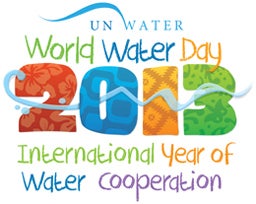 This year’s World Water Day (March 22) focuses on cooperation around water, so it’s a good time to reflect on lessons that those of us working on cooperation in international waters can learn from the experiences and accomplishments in water cooperation in the Nile Basin.
This year’s World Water Day (March 22) focuses on cooperation around water, so it’s a good time to reflect on lessons that those of us working on cooperation in international waters can learn from the experiences and accomplishments in water cooperation in the Nile Basin.
Since the 1960’s the countries of the Nile River Basin have worked towards advancing and capitalizing on the benefits of regional cooperation. The first success came in 1995, when the governments of the Nile countries took a bold step and established the Nile Council of Ministers of Water Resources (Nile-COM) and designed the Nile River Basin Action Plan. By 1998, the Nile-COM endorsed cooperation built around two complementary ideas: establishing a shared vision for the Nile Basin while advancing projects that benefit “the people and particularly the poor and disadvantaged in the Nile Basin.”
In 1999, the Nile-COM ministers established the Nile Basin Initiative (NBI) to execute these two programs of action and in 2003, the Nile Basin Trust Fund was established by a consortium of international donors, to support the Nile countries through the NBI, in its overarching goal: to achieve sustainable socio-economic development through equitable utilization of and benefit from, the common Nile Basin water resources.
This Trust Fund helps advance the policy guidelines adopted by the Nile Council of Ministers in 1999: “to develop the water resources of the Nile Basin in a sustainable and equitable way to ensure prosperity, security and peace for all its people; to ensure efficient water management and the optimal use of the resources; to ensure cooperation and joint action between the Nile Basin countries; to target poverty eradication and promote economic integration; and to ensure that the program results in a move from planning to action.”
By the end of 2012, the NBTF had supported a total of 28 NBI projects, including projects as part of the Shared Vision and Subsidiary Action Programs, and an Institutional Strengthening Program.
The NBTF has had many successes, including:
- · Creation of a regional institution that allows dialogue and technical discussions, two strong regional offices dedicated to implementation of investment projects, as well as national offices in Water Ministries
- · Investments costing $1billion identified, prepared or facilitated by the NBI, and for an additional $1 billion currently under preparation.
- · Establishment of a shared knowledge base and joint tools for river basin management and planning, including a world class decision support system. This has helped create a common understanding of the regional water resource base.
- · Training of over 600 regional and national professionals in skills needed for transboundary water management.
- · Adoption of new norms and ways of working cooperatively, as well as capacity building, which have equipped the 10 Nile Basin governments to participate in regional decision-making on the Nile River and its resources.
- · Transmission lines spanning the Ethiopian-Sudanese border, with multiple interconnections planned in the equatorial lakes region, and established protocols for sustained regional power trade.
- · Provision for new hydro-power generation, including the Rusumo Falls Hydropower Project, designed to serve Burundi, Rwanda and Tanzania and significantly increase coverage of electricity services in those countries.
- · Critical analysis to support improved regional watershed management in the Eastern Nile, where erosion and silting problems had become acute.
- · Improved flood preparedness, including new training for regional institutions, national agencies and communities so they can work together to minimize loss of life and property damage from periodic floods.
As the Bank is now launching the Program Cooperation in International Waters in Africa (CIWA), the Nile Basin provides several lessons, including:
- · Cooperation is a powerful tool for accommodating multipurpose uses of water, advancing development of nations, climate resilient growth, poverty reduction and regional integration
- · Cooperation requires the establishment of institutional mechanisms, including platforms, norms and mentalities that support continued dialogue and collaboration
- · Cooperation requires countries to develop a common knowledge base coupled with shared tools for analyzing future trends
- · Cooperation that fosters regional development projects underpinned by critical analysis, data and studies can pave the way for investments in infrastructure as well as capacity building and other related technical assistance programs.
The activities of riparian interaction should not be viewed as an end in themselves, but rather as a means to an end. Recognizing that infrastructure gaps can hold back economic growth and development entails demonstrating the benefits to countries of unlocking processes and investments in a cooperative rather than unilateral manner.


Join the Conversation